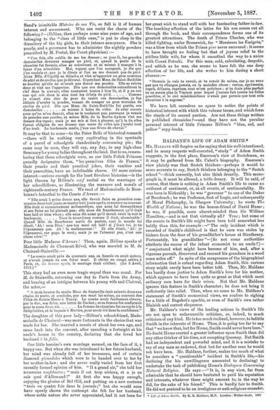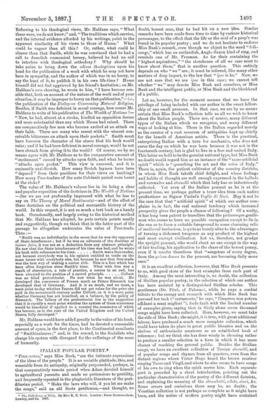HALDANE'S LIFE OF ADAM SMITH.*
Mn. HALDANE will forgive us for saying that his well-intentioned, and in many respects well-executed, " study " of Adam Smith suggests, in the first place, Emerson's view of Scotchmen, as it may be gathered from Mr. Cabot's biography. Emerson's view plainly was that Scotch thinkers—perhaps it would be more accurate to say, Scotch thinkers belonging to the " Scotch school "—think correctly, but also think drearily. This mono- graph is, it must be allowed, a trifle dreary. It will be said, of course, that there is nothing in Adam Smith's life to cause an outburst of sentiment, or, at all events, of sentimentality. He was born in Kirkcaldy ; he was "governor " to one of the Dukes of Buccleach ; he was Professor, first of Logic, and subsequently of Moral Philosophy, in Glasgow University ; be wrote The Wealth of Nations ; he was the bosom-friend of David Hume; he was, if possible, more absent-minded than Sir William Hamilton,—and is not that virtually all? Trne ; but some of the events in Smith's life might have been told somewhat less baldly than this, for example :—" The only incident which is recorded of Smith's childhood is that he once was stolen by tinkers from the door of his grandfather's house at Strathenry. Fortunately, his grandfather"—[do not sonde authorities attribute the rescue of the infant economist to an uncle ?]— " conjectured what might have become of him, and, after a vigorous pursuit, discovered and rescued his grandson in a wood some miles off." In spite of the meagreness of the biographical information that is extant regarding Adam Smith, this curious story might surely have been better told. Then, Mr. Haldane has hardly done justice to Adam Smith's love for hie mother, which appears to have been quite as great as that which most ordinary men have for their wives. Not that Mr. Haldane ignores this feature in Smith's character ; he does not bring it sufficiently into relief. Then, when we come to Mr. Haldane's statement of Smith's economical views, we confess to sighing for a little of Bagehot's sparkle, or even of Smith's own rather Blairish and correct eloquence.
Mr. Haldane's views of the leading actions in Smith's life are not open to unfavourable criticism, or, indeed, to much criticism of any kind. He is too much inclined, however, to belittle Smith in the interests of Hume. Thus, it is going too far to say that " we know that, but for Hume, Smith could never have been." No doubt Hume exerted a greater influence upon Smith than did any other thinker of his time, not excepting Qaesnay. But Smith had an independent and powerful mind, and it is a mistake to say of any man so endowed, that but for another man he would not have been. Mr. Haldane, further, makes too much of what he considers a "questionable" incident in Smith's life,—his declining (for his unwillingness amounted to declining) to undertake the task of publishing Hume's Dialogues Concerning Natural Religion. He says :—" It is, in any view, far from admirable that he should have hesitated to peril his reputation and interests, whatever these might amount to, in the way he did, for the sake of his friend." This is hardly fair to Smith. He did not pretend to be an irreligious or anti-religions crusader.
• life of Adam Smith. By B. B. Haldane, U.P. London Walter Scott. 1887
Referring to his theological views, Mr. Haldane says, " What these were, we do not know;" and, "The traditions which survive, and the internal evidence afforded by his writings, point to the apparent similarity of his views to those of Hume." What could be vaguer than all this P Or, rather, what could be clearer than that Smith, while he was convinced that he had a call to demolish economical heresy, believed he had no call to interfere with theological orthodoxy ? Why should he take pains to bring down the odium theologicuet upon his head for the publication of a work with which he may not have been in sympathy, and the author of which was in no hurry, to say the least of it, to publish it in his own life-time P Hume himself did not feel aggrieved by his friend's hesitation ; on Mr. Haldane's own showing, he wrote to him, " I have become sen- sible that, both on account of the nature of the work and of your situation, it may be improper to hurry on that publication,"—i.e., the publication of the Dialogues Concerning Natural Religion. Besides, if Smith was deficient in moral courage, how comes Mr. Haldane to write of his publication of The Wealth of Nations ?— " Now, he had, almost at a stroke, kindled an opposition fiercer and more substantial than any which Hume had raised. There are comparatively few men who become excited at an attack on their faith. There are many who resent with the utmost con- ceivable bitterness an attack upon their pockets." Smith must have foreseen the character of the storm that his book would raise; and if he had been deficient in moral courage, would he not have shrunk from giving it to the world ? Of course, we by no means agree with Mr. Haldane as to the comparative amount of " excitement " caused by attacks upon faith, and what he terms "attacks upon pocket." This view is unsound, and it is eminently anti-Scotch. How many Scotch laymen have been " deposed " from their positions for their views on banking!) How many Free-traders of the ante.Cobdenic period were burnt at the stake?
The value of Mr. Haldane's volume lies in its being a clear and popular exposition of the doctrines in The Wealth of Nations —(for we are not profoundly impressed with what he has to say on The Theory of Moral Sentiments)—and of the effect of these doctrines on the political and mercantile history of the world. In this respect, it is not so much a text book as a handy book. Occasionally, and largely owing to the historical method that Mr. Haldane has adopted, he puts certain points neatly and suggestively, though we think that in the latter part of the passage he altogether underrates the value of Free-trade. Thus :— " Smith was an individualist in the sense that he was the opponent of State interference ; but if he was an advocate of the doctrine of laissez faire, it was not as a deduction from any abstract principle. He saw that the State interference of his time was bad, and he wrote his book with reference to his time Smith was a free-trader, not because everybody was in his opinion entitled to trade on the same terms with everybody else, but because he saw that free-trade was the best way of making a nation rich. This ie a fact which has been often forgotten since Smith's time. What with him wee a result of observation, a rule of practice, a means to an end, has
been elevated to the position of a sacred principle Colbert was no blind protectionist. He saw what he was about. He developed the commerce of France much as Prince Bismarck has developed that of Germany. And it is as much, and no mere, a moot point to-day whether France did not get value for the price she paid in the seventeenth century under Colbert, as it is a most point whether Germany has not benefited, on a balance, by the policy of Bismarck. The fallacy of the protectionist lies in the suggestion that it is equally a moot point whether the system of these statesmen would be beneficial if applied to a country the commerce of which has become, as in the case of the United Kingdom and the United States, fully developed."
Mr. Haldane would have added greatly to the value of his book, especially as a work for the times, had he devoted a reasonable amount of space, in the first place, to the Continental assailants of " Smithianismus ;" and, in the second, to the Socialists who charge his system with disregard for the sufferings of the mass of humanity.



















































 Previous page
Previous page